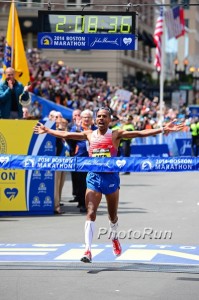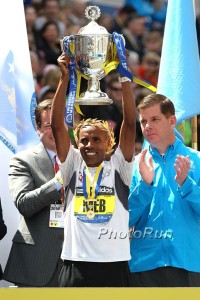Dick Patrick – Meb Strong: How Meb Worked His Magic Once Again
by: Dick Patrick for LetsRun.com
April 21, 2014
Really, could there have been a more perfect winner of Monday’s Boston Marathon than Meb Keflezighi?
Of course not. Because I wrote a book, Run to Overcome, with Meb in 2010, I might be biased toward someone who is more than admirable as a runner and human being. But that doesn’t mean I’m wrong.
Sometimes you win Boston; sometimes Boston wins you. Both happened in the 118th running of the race. Meb won the race with his legs, mind and heart – using the latter organ both cardiovascularly and emotionally. He ran a wonderful race – breaking away boldly and then hanging on gamely. The race got the ideal winner and not just because he was the first American male winner since Greg Meyer in 1983.
The bombings that killed three at last year’s race prompted the motto Boston Strong. The 118th running of the race illustrated Meb Strong.
The race meant more to Meb than any other elite. The fatalities and injuries from last year’s race were personal to Meb, who was in Boston but did not compete due to an injury that left him shy of training. He was near the bombing site shortly before the two blasts to check on some of the back-of-the-pack participants running as members of his foundation.
A year ago he was sobbing in a hotel near the finish line shortly after hearing the blasts and then learning of the tragedy. Deaths and carnage from terrorism resonated with someone who was born in Eritrea during a war with Ethiopia.
One of his earliest boyhood memories is of helping villagers clean up the body parts of a boy about his own age who was playing with a land mine that he thought was a toy. From a young age, he learned that life is precious.
So it was not lip service when Meb said he had thought about the injured and dead for a year. It was not a perfunctory gesture when Meb wrote the names of the trio of last year’s fatally injured on his racing bib. Those were genuine inspirations for him, during months of training and during the race.
There were other circumstances Monday similar to those that existed in his two other signature performances – his silver medal in the 2004 Athens Olympics marathon and his victory in the 2009 New York City Marathon.
Again, Meb was barely mentioned in pre-race publicity. A big part of that is that in an era of incredible improvement in marathon times, he does not have an eye-popping PR. In Athens he had the 39th best PR in the field. In New York, he was 10th. For Boston, he was 15th with his 2:09:08, recorded while finishing fourth in the 2012 London Olympics at 37.
Many in the sport no doubt thought that the wonderful second half of the race in London was his last hurrah. But Meb has a way of being at his best when it counts the most and when times are difficult. He knows how to work hard and work smart; he knows how to utilize inspiration to further fuel an incredible work ethic.
In 2004, he was running in Athens, a city with great personal meaning to the Keflezighi clan of 11 children. In 1986 the Keflezighi family was reunited in Athens, five years after Russom Keflezighi, the family patriarch, was forced to flea Eritrea for Sudan and later Italy. The Ethiopians were looking for him because he supplied arms to Eritreans during their war.
The family spent a few days in Athens before returning to Russom’s home in Italy. A year later, in 1987, they emigrated to San Diego because the parents desired American educations for their children. The return to Athens generated great motivation for Meb, who didn’t let an attack by a stray dog during a training run a few days before the race deter him.
In his New York win, Keflezighi was running to restore a career in jeopardy because of a hip stress fracture that occurred in late 2007 at the Olympic Trials marathon in NYC for the 2008 Beijing Olympics. Keflezighi was also running in memory of his friend and training partner, Ryan Shay, who died of cardiac arrest five miles into the Trials.
Once again, Meb wasn’t mentioned much in pre-race speculation at Boston. He was too slow, especially with five sub-2:05 guys. He was too old – he turns 39 in two weeks (on May 5, Cinqo de Mebo). He was finished as an elite marathoner, based on finishing 23rd in 2:23:47 at NYC last November, the result of interrupted training from a knee injury.
But Meb and Bob Larsen, his coach for 21 years, worked their magic once again. They found a way to get him healthy and training at a high level, adjusting his workouts for his advancing age and vulnerability to injuries. All Meb did Monday was jump the field with a shrewd and gutsy mid-race move and produce a 31-second PR with a 2:08:37.
Meb also produced another one of his drought ending performances. In Athens, it had been 28 years since Frank Shorter had won America’s last Olympic marathon medal. In New York, Meb broke another 28-year-drought that had started after Alberto Salazar’s 1982 win. In Boston, the streak was 32 years since Meyer.
Though Meb built a lead that grew to 81 seconds at 30K (18.6 miles), there was late-race suspense. Wilson Chebet cut the lead to eight seconds by 40K (24.8 miles) and then to six seconds. By that point in the race, Meb’s stride was getting a bit choppy and he was grimacing.
Announcers were speculating Keflezighi might be caught. Then everyone got a taste of Meb Strong. This is a guy who grew up in famine-plagued Eritrea so hungry that at times he ate moistened dirt, hoping to suck some nutrients from the soil.
His father covered more than 200 miles in a week through jungle while hiding from Ethiopians, outlaws and wild animals to get to the Sudan border. Meb’s mother, Awetash, held the family together through famine for five years. Pregnant or with a newborn on her hip, she often made 50-mile trips on foot, sometimes also herding the family’s precious two oxen, when the family had to move to different villages.
When the Keflezighis arrived in San Diego in 1987, the airline lost what little luggage they had and no one spoke English. Soon there were daily 5:30 a.m. sessions with a Tigrinya-English dictionary. Now all 11 children, who include a doctor, lawyer, MBA and engineer, have all graduated from or are attending California universities. Meb, with a BA from UCLA, is considered an academic slacker, though by now he has a PhD in the marathon.
Considering Meb’s past and the occasion one year after the bombings, Chebet had no chance. The Kenyan wound up 11 seconds back.
Down the finishing stretch on Boylston Street, the site of the bombings, Keflezhighi blessed himself a couple of times, just as he blessed himself in New York in 2009 when he passed the scene of Shay’s death. Meb also looked behind to check on Chebet and started giving arm pumps. He was aware enough to put his shades atop his forehead for a better photo op as he crossed the finish line, arms spread wide.
There was a long hug with his wife, Yordanos, three quick mini pushups – perhaps one for each of his daughters — and a primal scream of Wooo. He later got a finish line hug and some words from Meyer.
Over the years, Meb has been very candid about putting his career into context. He’s proud of his accomplishments but he acknowledged two unfulfilled wishes, to win Boston and break four minutes in the mile, which he nearly did at San Diego High with a 4:05.58.
I’m about to text him that when he finally retires from the marathon at 50 or so, he can drop down and fulfill the mile goal.
It will be hard to top Boston as the pinnacle of his career. He pulled another upset and ran another PR on a day filled with emotion. His unlikely win, his setting a PR at his age, his spirit and performance in consecrating the tragedy of a year ago were inspirational, uplifting.
When he said, “I feel blessed to have the opportunity to win the Boston title, not just for me, but for the people,” he meant it. It was sincere and powerful.
He was the perfect winner.
Dick Patrick, author of Meb Keflezighi’s Run to Overcome, has covered road racing for five decades for newspapers (most LRCers likely remember him at USA Today), and was overwhelmed covering his first Boston in 1986 by Rob de Castella’s course record. Now writing primarily for websites, he has covered more than 60 major marathons live, but was never more thrilled by a performance than seeing Monday’s race via television.
LRC Note: If you haven’t read, Run to Overcome, you should. Buy it here from Amazon.com. If you are an Amazon Prime member and have a kindle you can even rent it for free. Full disclosure LRC gets a commission if you buy it from our link.





